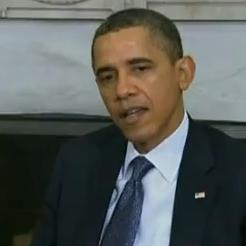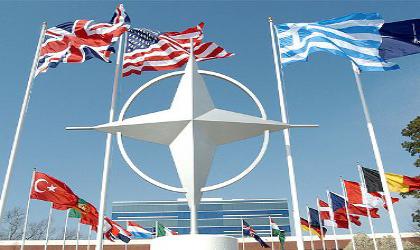Obama on Iran: The Specter of World War III

In an extraordinary speech delivered Wednesday, US President Barack Obama went public with a warning that powerful factions within Congress and the state apparatus are determined to carry out a war against Iran that would have incalculable consequences.
Speaking on the eve of the 70th anniversary of the atomic bombing of Hiroshima, Obama said that a scuttling of the nuclear deal with Iran that was announced last month would mean war with Iran—a country nearly four times as large and with almost triple the population of Iraq. He further suggested, harking back to World War II and the Cold War, that a war with Iran could open the door to a Third World War.
 At this juncture, it is not at all clear how the vote in Congress on the nuclear accord negotiated between Iran and the P5+1 (the US, China, Russia, Britain, France and Germany) and approved by the United Nations will go. Obama has announced that he will veto any measure that blocks the United States from implementing the agreement. Whether there are sufficient votes in both houses of Congress to assure the two-thirds majorities required to overturn a presidential veto is still undecided.
At this juncture, it is not at all clear how the vote in Congress on the nuclear accord negotiated between Iran and the P5+1 (the US, China, Russia, Britain, France and Germany) and approved by the United Nations will go. Obama has announced that he will veto any measure that blocks the United States from implementing the agreement. Whether there are sufficient votes in both houses of Congress to assure the two-thirds majorities required to overturn a presidential veto is still undecided.
What is beyond dispute is that a large majority of the US Congress will vote for a policy that is predicated on a catastrophic escalation of American militarism.
If the House of Representatives and the Senate override his veto, Obama warned, war will come, and “soon.” The commander-in-chief gave the unmistakable impression that control over the movement toward war was slipping out of his hands.
As Obama spelled out: “Congressional rejection of this deal leaves any US administration that is absolutely committed to preventing Iran from getting a nuclear weapon with one option, another war in the Middle East. I say this not to be provocative; I am stating a fact.”
The debate over this accord shows that the American political establishment, including its vast military and intelligence complex, is deeply divided over whether US imperialism should pursue its global interests by means of yet another, and far more dangerous, war in the Middle East. What is not in dispute is Washington’s supposed prerogative to wage preemptive war, i.e., criminal aggression, against whatever nations or peoples it chooses. The US president underscored this point, citing his own record.
“As commander-in-chief, I have not shied away from using force when necessary,” he boasted. “I have ordered tens of thousands of young Americans into combat… I’ve ordered military action in seven countries. There are times when force is necessary, and if Iran does not abide by this deal, it’s possible that we don’t have an alternative.”
Yet, for all his multiple interventions, drone missile murders and massacres, Obama considers war with Iran a highly dangerous undertaking. His argument is that Washington can pursue its interests by using the nuclear accord as leverage to shift the Iranian regime behind US imperialism, while keeping “the military option on the table” should this strategy fail.
The reasons for Obama’s fear of a precipitous confrontation with Tehran go beyond the bloodbath that a war on Iran would entail. The US president warned that a repudiation of the nuclear deal would provoke a dangerous confrontation with Russia and China. It would also, he strongly suggested, inflame relations with Washington’s allies in Europe, in the first instance Germany, as well with those in Asia. None of them, he declared, will bow to the “dictates of the US Congress” and enforce a unilateral American sanctions regime that has already cost their economies billions upon billions of dollars.
Germany, France, Italy and other European countries have already dispatched high-level delegations to Tehran to negotiate lucrative contracts. They have made it clear that they will not return to the negotiating table, much less to sanctions.
Berlin’s second-highest-ranking diplomat in Washington warned Thursday that a US repudiation of the nuclear deal “would be a nightmare…a catastrophe,” driving Iran and possibly other countries to rapidly pursue nuclear weapons in the knowledge that no negotiated agreement will be respected by the US.
If the US military attacks Iran as European capitalism attempts to penetrate its market, the end result could well be the death of the NATO alliance and the eruption of military tensions between Europe and America.
Obama also called attention to the implications of any attempt to force China to return to the sanctions regime. “We’d have to cut off countries like China from the American financial system,” he said. “And since they happen to be major purchasers of our debt, such actions could trigger severe disruptions in our own economy, and, by the way, raise questions internationally about the dollar’s role as the world’s reserve currency.”
Implicit in such an outcome is a military confrontation with China. It would also plunge the US and world economy into a full-scale Depression, Obama suggested.
But precisely such a course is being plotted by powerful sections of the American ruling elite. They are doing so behind the backs of the American people, who overwhelmingly oppose war. Given the chilling implications of Obama’s warnings, the reaction of the American media has been remarkably muted.
With the 2016 election campaign already under way, popular antiwar sentiment finds no expression whatsoever in the corrupt and bankrupt US political system. Millions of people may well wake up some time after the congressional vote on the Iran agreement in September to find the US at war once again, on a far greater scale than the interventions in Afghanistan and Iraq combined. They could be suddenly engulfed by a collapse of employment and living standards, with the entire planet on the precipice of a third, nuclear, world war.
The policies of those prepared to drive the world down this path are a reflection of the desperate crisis of the US capitalist system and the determination of the ruling class to offset American capitalism’s global decline by military means. Frustrated by the failure of US wars in Afghanistan, Iraq, Libya and Syria to secure undisputed US hegemony over the Middle East and Central Asia, they now want another roll of the dice for the much higher stakes of militarily subduing Iran, the country that bridges these two energy-rich regions.
In the most cowardly section of his speech, Obama attributed the rabid opposition to the Iran deal within the American establishment to
“sincere affinity for our friend and ally Israel, an affinity that…I deeply share.”
 There is nothing “sincere” about this poisonous relationship. The alignment with the Israeli regime by the most reactionary and reckless elements of the American political establishment is bound up with their common support for war.
There is nothing “sincere” about this poisonous relationship. The alignment with the Israeli regime by the most reactionary and reckless elements of the American political establishment is bound up with their common support for war.
The continuation and spread of what Obama’s predecessor termed “the wars of the 21st Century,” now including the promotion of war with Iran, also express the need to divert outward—in the form of ever greater eruptions of American militarism—the internal class tensions generated by growing social inequality.
This points to the only means of defeating American militarism and the threat of a Third World War—the development of the class struggle and the conscious preparation of the socialist revolution in the US and internationally.

